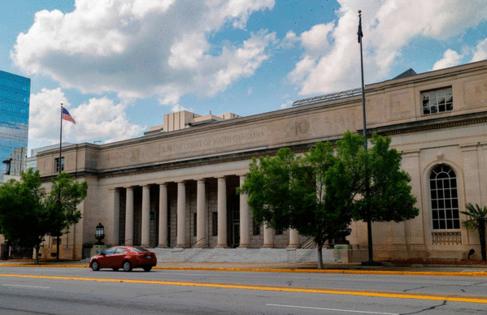Lawyer for SC death row inmate unprepared, 'infected' with racism, appeal says
Published in News & Features
COLUMBIA, S.C. — A South Carolina man who is expected to be the next person scheduled for execution has filed an appeal with the South Carolina Supreme Court, alleging that prosecutors withheld crucial evidence about witnesses and his own lawyer, “infected by his own racism,” did not adequately defend him.
Marion Bowman Jr. was convicted of shooting and killing Kandee Martin in the early morning hours of Feb.17, 2001. Bowman and his accomplices were planning to rob a house but came to believe that Martin was “wearing a wire,” according to court filings. Martin was shot in the head and her body was stuffed in the trunk of a car, which was then set on fire on Nursery Road in Dorchester County.
Bowman was convicted of murder and arson, third degree, and sentenced to death in 2002. He is scheduled to be the next person executed in South Carolina, making him the third person executed in the state since the state resumed carrying out the death penalty in September following a 13 year pause.
A petition for a writ of habeas corpus was filed by Bowman’s attorneys in the South Carolina Supreme Court on Tuesday. It asks that Bowman’s execution, which has yet to be scheduled but is expected to take place in January, be delayed until a hearing can be held.
“I think that whole filling really calls into questions the reliability of the death penalty sentence and the conviction in this case,” said Bowman’s attorney, Lindsey Vann. “The death penalty is the ultimate punishment and we cannot correct any issues after it is carried out.”
Central to their argument are claims that Bowman’s attorney at his original trial, Norb Cummings, “injected odious racial prejudice into the case.” Cummings was so “infected by his own racism” that he repeatedly drew comparisons between Martin, who he called “a little white” girl and Bowman, who he described as a “Black man.”
At the time of the murder, Martin was 21 and a year older than Bowman.
A call Friday to Cumming’s law office was not returned.
Bowman’s attorneys also failed to introduce credible evidence that Martin had a drug addiction and history of prostitution and pawning personal items for drugs. Cummings later testified that he did not want to “slander” Martin at trial.
An attorney who represented Bowman in past appeals described Cummings as an “abject racist,” who while being questioned in court about Bowman’s case turned to his former client and said, “Marion, what are you doing on Nursery Road at that time of the morning with a white female and African American males in Dorchester County? Really. This is 2001 but what good are you doing out there on a dirt road?”
This statement stunned the courtroom into silence, the attorney wrote in his affidavit.
Cummings also urged Bowman to accept an offer of life in prison and plead guilty. While Cummings argued at trial that Bowman maintained his innocence, the lawyer told his client that a jury would not be sympathetic to a Black man who had killed a white woman.
An affidavit signed by Robert Minter, an investigator who worked for Cummings on Bowman’s case, described the attorney as an unusually “hands off” attorney who did not seem to care if work got done and was reluctant to file subpoenas to aid in Bowman’s defense. Additionally, Minter wrote that his co-counsel was “lackluster.”
“I believe if Mr. Bowman had different trial attorneys, then his case might have resulted in a different outcome,” Minter wrote.
Problems with his attorney were not the only obstacle faced by Bowman at trial, according to court filings.
Significantly, prosecutors did not hand over evidence that a key witness, James “Tawain” Gadson, was suffering from memory loss and blackouts, was hearing voices and a “beeping sound,” in addition to smoking six blunts, a type of marijuana cigar, a day.
Gadson also told another inmate at the jail he was confined at that he was the one who shot Martin, not Bowman. While law enforcement interviewed the inmate, notes of the interview were not turned over to Bowman’s defense and were only discovered after the trial.
While the inmate later threatened to recant his testimony, according to court filings, as an official document the notes could have had “significant evidentiary weight to a juror,” Bowman’s attorneys wrote.
Gadson’s testimony was particularly important because he was the only eyewitness to Martin’s murder and he provided details about aggravating factors that allowed prosecutors to seek the death penalty.
Prosecutors also did not disclose that they had made deals with another key witnesses, Hiram Johnson. Johnson had unindicted charges for receiving stolen goods, second degree burglary, and grand larceny at the time of Bowman’s trial. Information about these charges was not provided to Bowman’s attorneys
This allowed prosecutors to take advantage of an “informational void,” according to the filing. At trial, the solicitor told the jury that they could trust Johnson’s testimony because they “hadn’t heard any testimony about Hiram Johnson having any kind of charge against him or any kind of a deal with the state, any reason to say something wasn’t true,’” according to court filings.
Bowman is represented by Vann with Justice360, a Columbia-based nonprofit death penalty law firm, along with Teresa L. Norris from the Fourth Circuit Federal Defenders Office and S. Boyd Young with the South Carolina Commission on Indigent Defense.
The South Carolina Supreme Court has said that they will not provide a notice of Bowman’s execution until Jan. 3, meaning that his execution could be scheduled for as soon as Jan. 31.
©2024 The State. Visit thestate.com. Distributed by Tribune Content Agency, LLC.







Comments